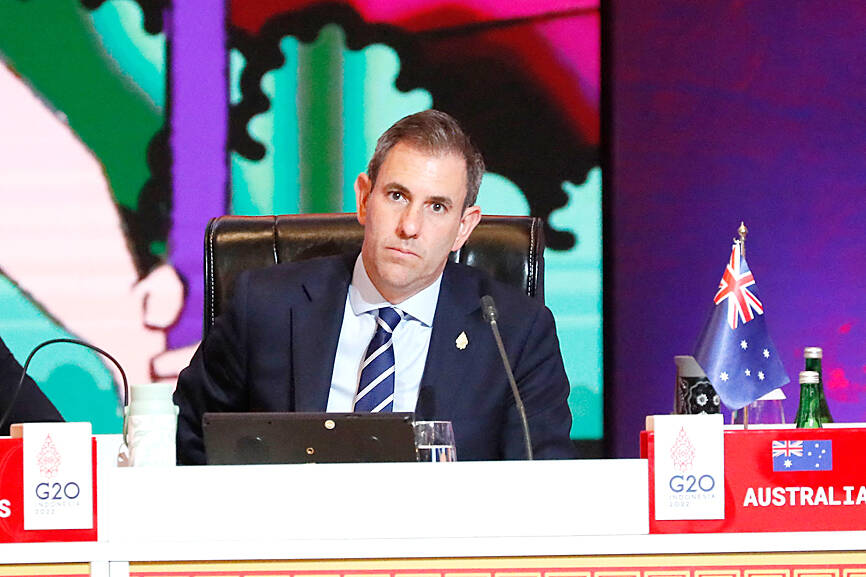Australia is vowing more assertive scrutiny of foreign investments in key commodities tied to electric vehicles and clean energy, in a potential warning to China which dominates the market.
Australian Treasurer Jim Chalmers has asked the country’s Treasury to work with the Australian Foreign Investment Review Board and other stakeholders to undertake a review of foreign investment in sectors such as lithium and rare earths, he told a conference in Sydney yesterday.
“We’ll need to be more assertive about encouraging investment that clearly aligns with our national interest in the longer term,” Chalmers said.

Photo: AFP
Although Chalmers did not directly identify China investment as a target of the review, the nation’s dominance of the market had led to “inherent vulnerabilities of concentrated supply chains,” Australian Minister for Resources Madeleine King said in a speech earlier this month.
Australia’s latest move adds to a broader push against China’s dominance of battery metals and renewable energy technology following action by US President Joe Biden aimed at limiting Chinese influence on key supply chains.
Canada last month strengthened its rules around foreign investments in the sector, and ordered three Chinese firms to sell their stakes in a trio of lithium explorers.
Australia, which has some of the world’s largest deposits of the resources vital to clean energy, military technology and advanced computers, has been working with the US to build its capacity in mining and processing of lithium and other critical minerals.
Biden has offered incentives to boost domestic production, and called on allies to bolster processing capabilities.
Ganfeng Lithium Group Co (贛鋒鋰業集團) and Tianqi Lithium Corp (天齊鋰業) — China’s top two lithium producers — hold stakes in key operations in Australia. Ganfeng holds 50 percent of the Western Australian Mount Marion Mine, while Tianqi controls the Kwinana Oil Refinery and a share of Western Australia’s Greenbushes, the world’s biggest lithium mine.
In February, China-based Shenghe Resources Holding Co (盛和資源) added a 19.9 percent stake in Peak Rare Earths Ltd, a Perth-based developer of projects in Africa and the UK.
King last month said that there has been interest in the sectors from investors in the EU and from partners in South Korea.
Despite discussions among lithium-producing nations in South America on a possible agreement on production and pricing, and in Asia on a similar set up for nickel and other key battery minerals, Chalmers ruled out Australia’s potential involvement in creating an “OPEC-like” partnership for critical minerals.
Indonesian Minister of Investment Bahlil Lahadalia earlier this month floated the idea of an alliance of nickel suppliers that he said would help unite government policies on the in-demand battery metal.
The plan had been discussed with Canada and Australia.
“We’d be better off responding by diversifying global supply chains and making them more resilient,” Chalmers said.

Among the rows of vibrators, rubber torsos and leather harnesses at a Chinese sex toys exhibition in Shanghai this weekend, the beginnings of an artificial intelligence (AI)-driven shift in the industry quietly pulsed. China manufactures about 70 percent of the world’s sex toys, most of it the “hardware” on display at the fair — whether that be technicolor tentacled dildos or hyper-realistic personalized silicone dolls. Yet smart toys have been rising in popularity for some time. Many major European and US brands already offer tech-enhanced products that can enable long-distance love, monitor well-being and even bring people one step closer to

Malaysia’s leader yesterday announced plans to build a massive semiconductor design park, aiming to boost the Southeast Asian nation’s role in the global chip industry. A prominent player in the semiconductor industry for decades, Malaysia accounts for an estimated 13 percent of global back-end manufacturing, according to German tech giant Bosch. Now it wants to go beyond production and emerge as a chip design powerhouse too, Malaysian Prime Minister Anwar Ibrahim said. “I am pleased to announce the largest IC (integrated circuit) Design Park in Southeast Asia, that will house world-class anchor tenants and collaborate with global companies such as Arm [Holdings PLC],”

Sales in the retail, and food and beverage sectors last month continued to rise, increasing 0.7 percent and 13.6 percent respectively from a year earlier, setting record highs for the month of March, the Ministry of Economic Affairs said yesterday. Sales in the wholesale sector also grew last month by 4.6 annually, mainly due to the business opportunities for emerging applications related to artificial intelligence (AI) and high-performance computing technologies, the ministry said in a report. The ministry forecast that retail, and food and beverage sales this month would retain their growth momentum as the former would benefit from Tomb Sweeping Day

Thousands of parents in Singapore are furious after a Cordlife Group Ltd (康盛人生集團), a major operator of cord blood banks in Asia, irreparably damaged their children’s samples through improper handling, with some now pursuing legal action. The ongoing case, one of the worst to hit the largely untested industry, has renewed concerns over companies marketing themselves to anxious parents with mostly unproven assurances. This has implications across the region, given Cordlife’s operations in Hong Kong, Macau, Indonesia, the Philippines and India. The parents paid for years to have their infants’ cord blood stored, with the understanding that the stem cells they contained